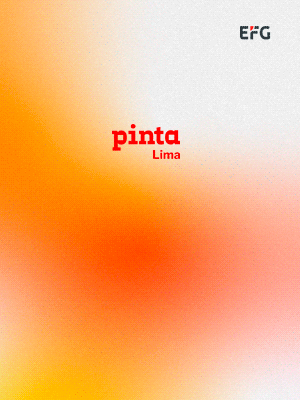ICONOGRAPHY, MEMORY AND HISTORY - THE MONTENEGRO PAVILION
It takes an Island to Feel this Good is Darja Bajagić’s exhibition for the Montenegro pavilion at Venice Biennale 2024. Curated by Ana Simona Zelenović and organized by the Museum of Contemporary Art of Montenegro at the initiative of commissioner Vladislav Šćepanović, the exhibition will present a critical consideration of the culture of collective memory and the relationship to shared historical heritage.
Through painting and sculpture, the artist examines and reflects upon the themes of collective memory and historical heritage, focusing on the complex and multidimensional history of the Montenegrin island of Mamula. Bajagić has spent two years researching Mamula’s history, specifically changes in its rule and function, in Montenegrin state archives; this collected material serves as the starting point for the artist’s visual compositions. The iconography of the paintings combines the aforementioned archival material with distinctive referential and symbolical interventions, characteristic of Bajagić’s work.
In her decade-long practice, Bajagić explores the ambivalence of the image, that is, dualistic representation, symbolism, and meaning. Referencing a diverse range of sources, such as dark-web sites, news media content, and religious histories, to name a few, her works—complex iconographical representations that are composed of layers of contemplated phenomena—unravel and develop in stages.
Bajagić and her project correspond to and build upon the theme of the 60th Venice Biennale, titled Stranieri Ovunque—Foreigners Everywhere, curated by Adriano Pedrosa, in numerous ways. Contextually, the Mamula fort is categorically linked to the idea of “foreign” seeing as it was built by the Austro-Hungarian Empire, obtaining its present-day name after the general who oversaw its construction; converted into a concentration camp by the fascist forces of Benito Mussolini’s Kingdom of Italy during World War II; and revitalized, beginning in 2016, with the assistance of foreign investments. The project raises critical and pertinent philosophical questions about the position of the Other, investigating how the determination of this position determines power relations in society as well as over discourse.
-
Pavilion of MONTENEGRO. It Takes an Island to Feel This Good. 60th International Art Exhibition - La Biennale di Venezia. Photo: Andrea Avezzù. Courtesy: La Biennale di Venezia
-
Pavilion of MONTENEGRO. It Takes an Island to Feel This Good. 60th International Art Exhibition - La Biennale di Venezia. Photo: Andrea Avezzù. Courtesy: La Biennale di Venezia
-
Pavilion of MONTENEGRO. It Takes an Island to Feel This Good. 60th International Art Exhibition - La Biennale di Venezia. Photo: Andrea Avezzù. Courtesy: La Biennale di Venezia
-
Pavilion of MONTENEGRO. It Takes an Island to Feel This Good. 60th International Art Exhibition - La Biennale di Venezia. Photo: Andrea Avezzù. Courtesy: La Biennale di Venezia
-
Pavilion of MONTENEGRO. It Takes an Island to Feel This Good. 60th International Art Exhibition - La Biennale di Venezia. Photo: Andrea Avezzù. Courtesy: La Biennale di Venezia
-
Pavilion of MONTENEGRO. It Takes an Island to Feel This Good. 60th International Art Exhibition - La Biennale di Venezia. Photo: Andrea Avezzù. Courtesy: La Biennale di Venezia
Darja Bajagić was born in 1990 in Podgorica, Montenegro, and raised in Egypt and the United States. In 2014, Bajagić became the first national of Montenegro to graduate with a Master of Fine Arts from the Yale University School of Art. Selected institutional solo exhibitions include Goregeous, Le Confort Moderne, Poitiers, France (2020); Born Losers, Hessel Museum of Art, Annandale-on-Hudson, NY (2018); Unlimited Hate, Künstlerhaus, Halle für Kunst & Medien (KM-), Graz, Austria (2016). Selected institutional group exhibitions have taken place at National Gallery Prague, Czech Republic (2021); Casino Luxembourg (2020); Futura Centre for Contemporary Art, Prague, Czech Republic (2019); Es Baluard Museu d’Art Contemporani de Palma, Spain (2018); Contemporary Art Centre (CAC), Vilnius, Lithuania (2018); LUMA Westbau, Zürich (2017, 2015, 2014); Musée d’Art Moderne de Paris (2015); Moderna Museet, Stockholm (2015); Museum of Modern Art Warsaw (2014); Museum of Contemporary Art of Oaxaca (2014); Museum of Applied Arts (MAK), Vienna (2013). Her work has been included in the 42nd Montenegrin Salon of Visual Arts, Cetinje, Mexico (2020); the 57th October Salon, Belgrade, Serbia (2018); and the 13th Baltic Triennial of International Art, Vilnius, Lithuania (2018).
Related Topics
May interest you
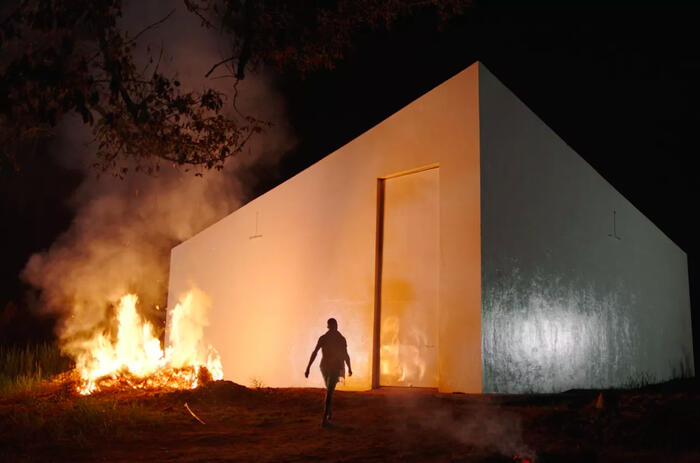
The title of the 60th International Art Exhibition of the Biennale di Venezia, "Stranieri Ovunque", refers, in part, to foreignness as the inherent nature of the subject. Understood in this way, the national pavilions of Spain, the Netherlands and the United Kingdom exhibit artistic proposals that develop the theme of colonialism and reconstruct histories, remedy ties between identity and territory, and explore the dramatic plurality of this potent historical axis. That said, this review does not intend to unveil or unpack the most unjust transcendental truths, but merely to reflect on the musings of others.
THREE PAVILIONS AT BIENNALE 2024 THAT EXPLORE THEIR OWN COLONIAL PASTS
The title of the 60th International Art Exhibition of the Biennale di Venezia, "Stranieri Ovunque", refers, in part, to foreignness as the inherent nature of the subject. Understood in this way, the national pavilions of Spain, the Netherlands and the United Kingdom exhibit artistic proposals that develop the theme of colonialism and reconstruct histories, remedy ties between identity and territory, and explore the dramatic plurality of this potent historical axis. That said, this review does not intend to unveil or unpack the most unjust transcendental truths, but merely to reflect on the musings of others.

The title of the 60th International Art Exhibition of the Biennale di Venezia, "Stranieri Ovunque", refers, in part, to foreignness as the inherent nature of the subject. Understood in this way, the national pavilions of Spain, the Netherlands and the United Kingdom exhibit artistic proposals that develop the theme of colonialism and reconstruct histories, remedy ties between identity and territory, and explore the dramatic plurality of this potent historical axis. That said, this review does not intend to unveil or unpack the most unjust transcendental truths, but merely to reflect on the musings of others.
THREE PAVILIONS AT BIENNALE 2024 THAT EXPLORE THEIR OWN COLONIAL PASTS
The title of the 60th International Art Exhibition of the Biennale di Venezia, "Stranieri Ovunque", refers, in part, to foreignness as the inherent nature of the subject. Understood in this way, the national pavilions of Spain, the Netherlands and the United Kingdom exhibit artistic proposals that develop the theme of colonialism and reconstruct histories, remedy ties between identity and territory, and explore the dramatic plurality of this potent historical axis. That said, this review does not intend to unveil or unpack the most unjust transcendental truths, but merely to reflect on the musings of others.
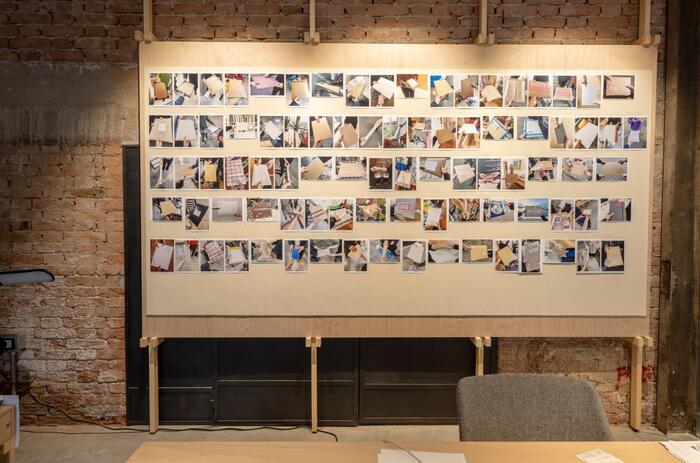
Engaging with the theme of Adriano Pedrosa’s main exhibition for the Venice Biennale, Stranieri Ovunque—Foreigners Everywhere, Vlatka Horvat’s project for the Croatian Pavilion by the Means at Hand, curated by Antonia Majaca, exists as an accumulative exhibition of artworks by a wide-ranging group of international artists living as “foreigners,” reflecting on questions and urgencies of the diasporic experience.
CROATIAN PAVILION AT THE VENICE BIENNALE
Engaging with the theme of Adriano Pedrosa’s main exhibition for the Venice Biennale, Stranieri Ovunque—Foreigners Everywhere, Vlatka Horvat’s project for the Croatian Pavilion by the Means at Hand, curated by Antonia Majaca, exists as an accumulative exhibition of artworks by a wide-ranging group of international artists living as “foreigners,” reflecting on questions and urgencies of the diasporic experience.
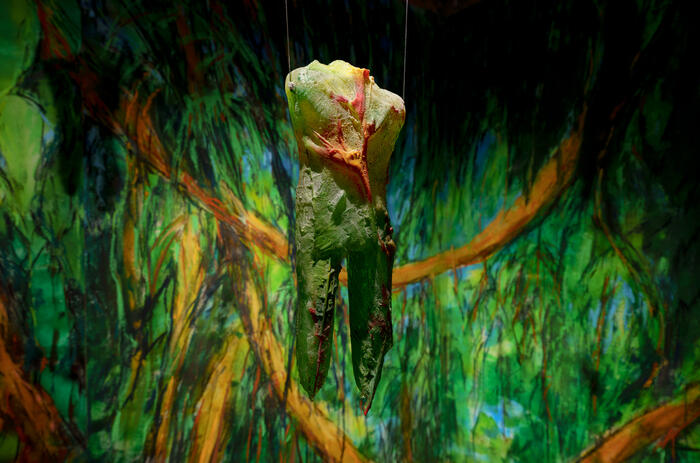
The Panama Pavilion at the 2024 Venice Art Biennale arises as a profound reflection on the enduring traces that migration leaves on individuals and their surroundings. Entitled Traces: On the Body and on the Land, this exhibition echoes the current migration crisis with a particular focus on the Panamanian context, interpreted by four artists through drawings, paintings, collages, glass sculptures, and installations.
TRACES – PANAMÁ’S DEBUT AT THE VENICE BIENNALE
The Panama Pavilion at the 2024 Venice Art Biennale arises as a profound reflection on the enduring traces that migration leaves on individuals and their surroundings. Entitled Traces: On the Body and on the Land, this exhibition echoes the current migration crisis with a particular focus on the Panamanian context, interpreted by four artists through drawings, paintings, collages, glass sculptures, and installations.
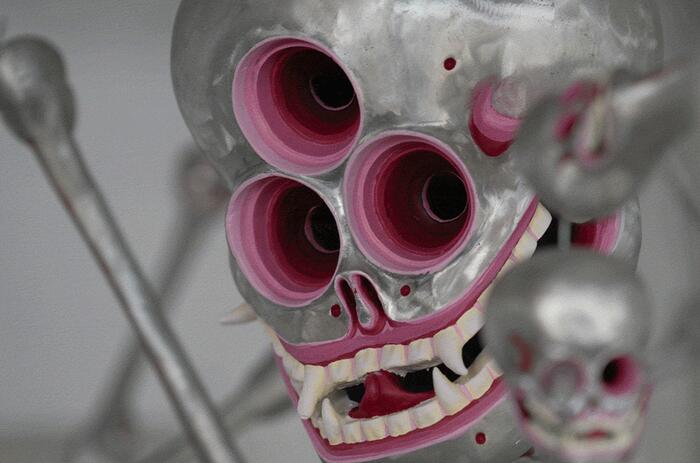
The Mongolian Pavilion at the Venice Biennale presents artist Ochirbold Ayurzana with the exhibition Discovering the Present from the Future. The proposal is curated by Oyuntuya Oyunjargal, the Cultural Envoy of Mongolia to Germany, and co-curated by Gregor Jansen, director of the Kunsthalle Düsseldorf in Germany.
OCHIRBOLD AYURZANA AT THE MONGOLIAN PAVILION
The Mongolian Pavilion at the Venice Biennale presents artist Ochirbold Ayurzana with the exhibition Discovering the Present from the Future. The proposal is curated by Oyuntuya Oyunjargal, the Cultural Envoy of Mongolia to Germany, and co-curated by Gregor Jansen, director of the Kunsthalle Düsseldorf in Germany.
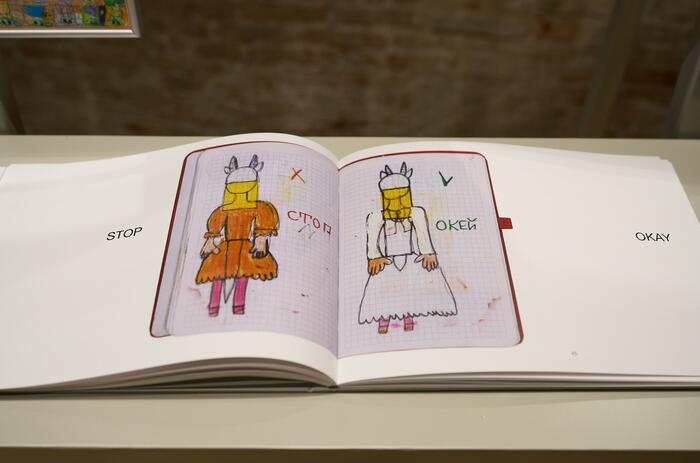
The Ukranian Pavilion addresses the othering effect of war, two years into the Russian Invasion, in Net Making at the 60th Venice Biennale.
UKRAINE AND THE EFECT OF WAR AT VENICE BIENNALE
The Ukranian Pavilion addresses the othering effect of war, two years into the Russian Invasion, in Net Making at the 60th Venice Biennale.
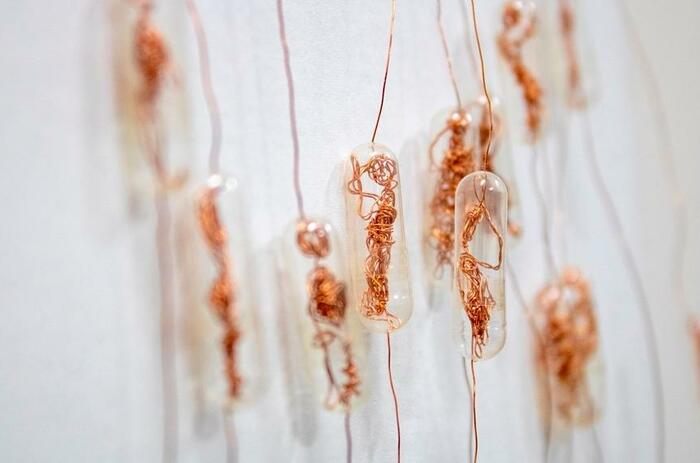
The Patio Herreriano Museum hosts the recent proposal by Sandra Gamboa (Bogota, Colombia) in which she outlines the necessary arguments to be able to analyse mental health, especially anxiety and depression. In Encapsulados, the Colombian-Spanish artist invites us to carry out this exercise of understanding, rapprochement and empathy with those who suffer from one of the great plagues of this century through the different related iconography that fills the exhibition hall of the Castilian institution.
ENCAPSULADOS, BY SANDRA GAMBOA, IN VALLADOLID
The Patio Herreriano Museum hosts the recent proposal by Sandra Gamboa (Bogota, Colombia) in which she outlines the necessary arguments to be able to analyse mental health, especially anxiety and depression. In Encapsulados, the Colombian-Spanish artist invites us to carry out this exercise of understanding, rapprochement and empathy with those who suffer from one of the great plagues of this century through the different related iconography that fills the exhibition hall of the Castilian institution.
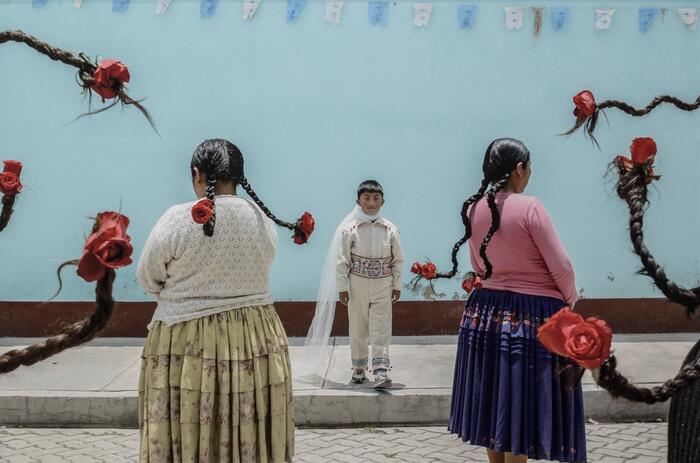
Why highlight stories that often remain on the periphery of artistic discourse? Adriano Pedrosa justifies his curatorial decision with works by 331 artists -mostly from the global south- that open the way to powerful narratives. Finally, we see the axis being twisted. It is difficult to escape the white gaze, more so to move authentically through a Eurocentric space. Given this, the communicative reach of figuration serves to challenge the symbolic order of domination and destabilize the colonial project. The stories that are made explicit and the narratives of magic and everyday life help to recognize without revictimizing.
STORIES FROM THE SOUTH – THE VENICE BIENNALE TURNS AROUND ITS AXIS
Why highlight stories that often remain on the periphery of artistic discourse? Adriano Pedrosa justifies his curatorial decision with works by 331 artists -mostly from the global south- that open the way to powerful narratives. Finally, we see the axis being twisted. It is difficult to escape the white gaze, more so to move authentically through a Eurocentric space. Given this, the communicative reach of figuration serves to challenge the symbolic order of domination and destabilize the colonial project. The stories that are made explicit and the narratives of magic and everyday life help to recognize without revictimizing.
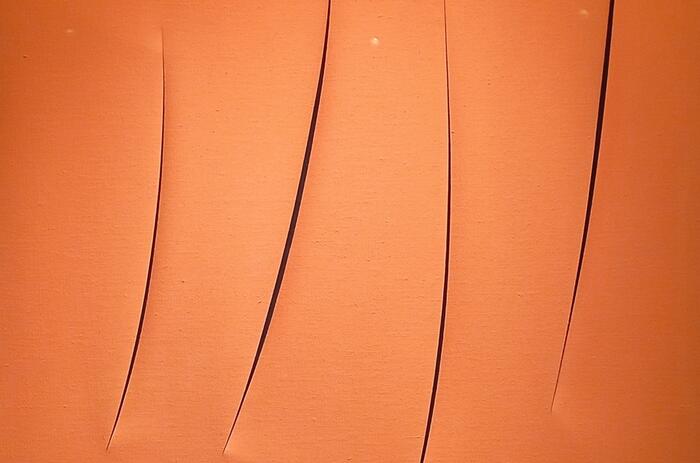
Lucio Fontana made one of the most extraordinary and radical gestures of modern art in 1958 when he cut the surface of a monochromatic canvas with a razor blade. The exhibition “Il y a eu un futur- Un Futuro c'é stato” at the Musée Soulage, Rodez, revisits the legacy of this artist and offers a survey of his entire oeuvre, before and after the war, in Argentina and Italy.
LUCIO FONTANA. IL Y A BIEN EU UN FUTUR - UN FUTURO C'É STATO
Lucio Fontana made one of the most extraordinary and radical gestures of modern art in 1958 when he cut the surface of a monochromatic canvas with a razor blade. The exhibition “Il y a eu un futur- Un Futuro c'é stato” at the Musée Soulage, Rodez, revisits the legacy of this artist and offers a survey of his entire oeuvre, before and after the war, in Argentina and Italy.
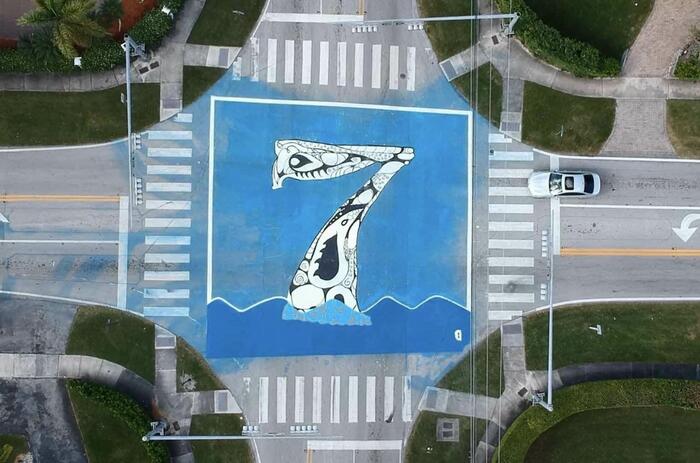
Cultural Programs of the National Academy of Sciences announces Xavier Cortada: Climate Science Art a solo exhibition at Washington, D.C. featuring Miami-based artist Xavier Cortada's climate change-focused artwork from Miami-Dade County, Florida, and the North and South Poles, spanning from 2007 to the present.
XAVIER CORTADA: CLIMATE SCIENCE ART
Cultural Programs of the National Academy of Sciences announces Xavier Cortada: Climate Science Art a solo exhibition at Washington, D.C. featuring Miami-based artist Xavier Cortada's climate change-focused artwork from Miami-Dade County, Florida, and the North and South Poles, spanning from 2007 to the present.
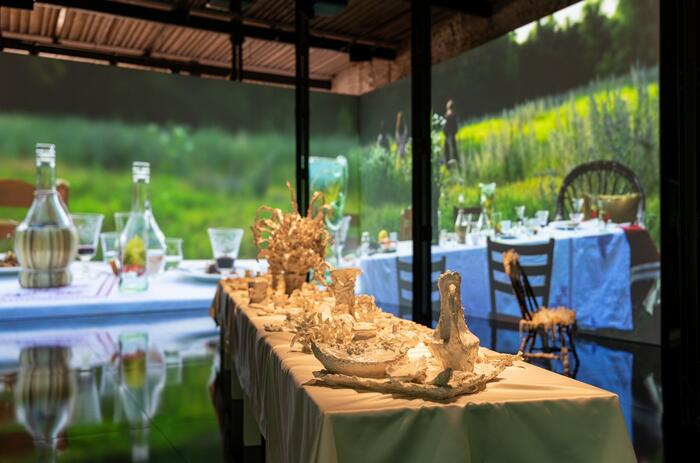
The Mexico Pavilion at the Venice Biennale 2024 proposes an immersive experience that invites the viewer to reflect on the act of migrating and its impact on identity and sense of belonging. As we marched away, we were always coming back is Erick Meyenberg's project curated by Tania Ragasol. It includes elements created in Mexico, Italy and Albania.
THE PATH OF MEMORIES – MEXICO AT THE BIENNALE
The Mexico Pavilion at the Venice Biennale 2024 proposes an immersive experience that invites the viewer to reflect on the act of migrating and its impact on identity and sense of belonging. As we marched away, we were always coming back is Erick Meyenberg's project curated by Tania Ragasol. It includes elements created in Mexico, Italy and Albania.
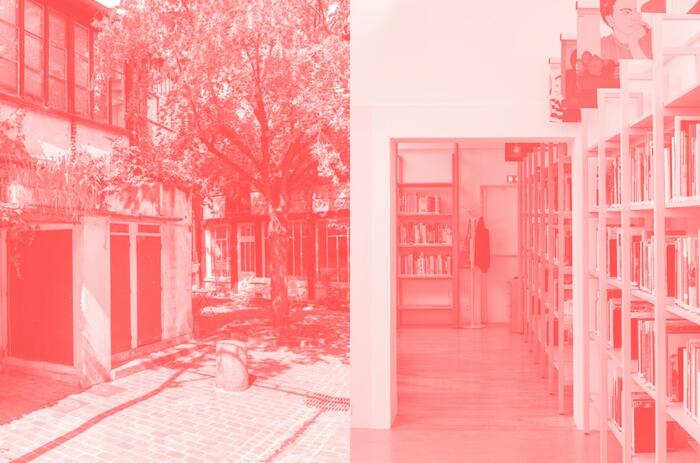
AWARE: Archives of Women Artists, Research and Exhibitions announced a residency at the Villa Vassilieff in Paris for research on women and non-binary photographers and video artists. During this three-month residency, the selected candidate will be invited to present their research during a public event as well as to write a research article for publication on the AWARE website. The residency includes an independent studio apartment within the Villa Vassilieff, a monthly living allowance, and transportation to and from Paris.
RESIDENCY FOR RESEARCH ON WOMEN & NONBINARY PHOTOGRAPHERS AND VIDEO ARTISTS
AWARE: Archives of Women Artists, Research and Exhibitions announced a residency at the Villa Vassilieff in Paris for research on women and non-binary photographers and video artists. During this three-month residency, the selected candidate will be invited to present their research during a public event as well as to write a research article for publication on the AWARE website. The residency includes an independent studio apartment within the Villa Vassilieff, a monthly living allowance, and transportation to and from Paris.
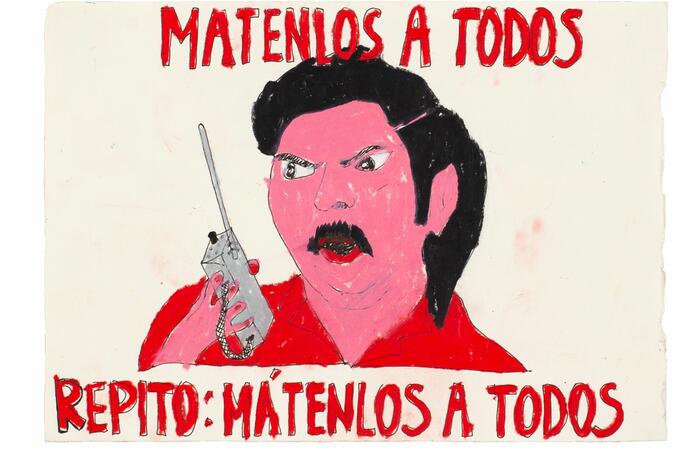
The double problem that arose from the acquisition in the 1980s of several hippopotamuses in one of the many eccentricities of the trafficker Pablo Escóbar is the starting point of a fable that, between the tragic and the comic, Camilo Restrepo (Medellín, Colombia, 1975) has managed to weave with a very successful graphic and conceptual narrative. With Cocaine Hippos Sweat Blood, the spectator faces this surrealistic story from its beginnings to the present by the hand of a figurativism that sets aside the academic and the technical for the sake of a greater aesthetic and relational concordance with that of the madness transmitted by the story itself.
THE NARCO-HYPOPOTAMUSES’ TALE, BY CAMILO RESTREPO
The double problem that arose from the acquisition in the 1980s of several hippopotamuses in one of the many eccentricities of the trafficker Pablo Escóbar is the starting point of a fable that, between the tragic and the comic, Camilo Restrepo (Medellín, Colombia, 1975) has managed to weave with a very successful graphic and conceptual narrative. With Cocaine Hippos Sweat Blood, the spectator faces this surrealistic story from its beginnings to the present by the hand of a figurativism that sets aside the academic and the technical for the sake of a greater aesthetic and relational concordance with that of the madness transmitted by the story itself.
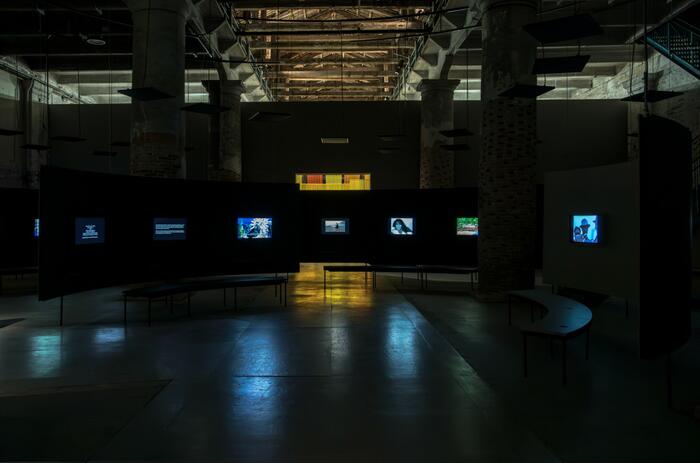
Disobedience Archive is a video archive project in constant transformation, linking artistic practices and political action. At the Venice Biennale exhibition, it takes the form of The Zoentrope, a pre-cinematographic machine that gives life to a space that generates new perspectives.
A GUIDE FOR PRACTICING DISOBEDIENCE
Disobedience Archive is a video archive project in constant transformation, linking artistic practices and political action. At the Venice Biennale exhibition, it takes the form of The Zoentrope, a pre-cinematographic machine that gives life to a space that generates new perspectives.
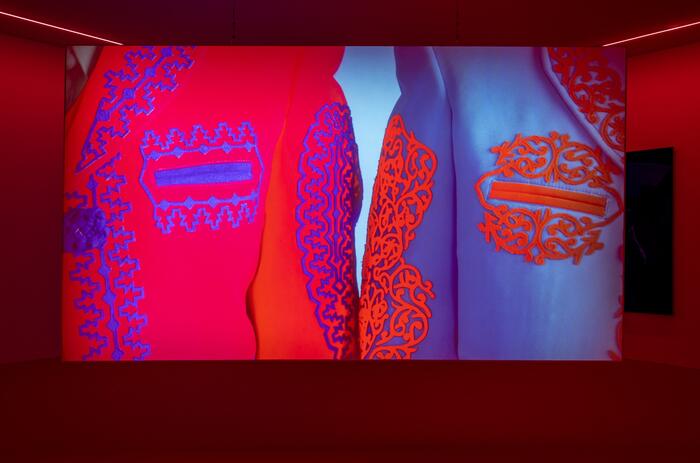
The voices of Latin American artists emerge strongly in this 2024 edition of the Venice Biennale. Claudia Alarcón, Julia Isídrez and Juana Marta Rodas, Ana Segovia, Frieda Toranzo Jaeger and Claudia Andújar lead viewers on a profound journey through their cultural heritage and unique artistic practices.
FIVE LATIN AMERICAN ARTISTS EXHIBITING FOR THE FIRST TIME AT THE VENICE BIENNALE
The voices of Latin American artists emerge strongly in this 2024 edition of the Venice Biennale. Claudia Alarcón, Julia Isídrez and Juana Marta Rodas, Ana Segovia, Frieda Toranzo Jaeger and Claudia Andújar lead viewers on a profound journey through their cultural heritage and unique artistic practices.

The title of the 60th International Art Exhibition of the Biennale di Venezia, "Stranieri Ovunque", refers, in part, to foreignness as the inherent nature of the subject. Understood in this way, the national pavilions of Spain, the Netherlands and the United Kingdom exhibit artistic proposals that develop the theme of colonialism and reconstruct histories, remedy ties between identity and territory, and explore the dramatic plurality of this potent historical axis. That said, this review does not intend to unveil or unpack the most unjust transcendental truths, but merely to reflect on the musings of others.
THREE PAVILIONS AT BIENNALE 2024 THAT EXPLORE THEIR OWN COLONIAL PASTS
The title of the 60th International Art Exhibition of the Biennale di Venezia, "Stranieri Ovunque", refers, in part, to foreignness as the inherent nature of the subject. Understood in this way, the national pavilions of Spain, the Netherlands and the United Kingdom exhibit artistic proposals that develop the theme of colonialism and reconstruct histories, remedy ties between identity and territory, and explore the dramatic plurality of this potent historical axis. That said, this review does not intend to unveil or unpack the most unjust transcendental truths, but merely to reflect on the musings of others.

Engaging with the theme of Adriano Pedrosa’s main exhibition for the Venice Biennale, Stranieri Ovunque—Foreigners Everywhere, Vlatka Horvat’s project for the Croatian Pavilion by the Means at Hand, curated by Antonia Majaca, exists as an accumulative exhibition of artworks by a wide-ranging group of international artists living as “foreigners,” reflecting on questions and urgencies of the diasporic experience.
CROATIAN PAVILION AT THE VENICE BIENNALE
Engaging with the theme of Adriano Pedrosa’s main exhibition for the Venice Biennale, Stranieri Ovunque—Foreigners Everywhere, Vlatka Horvat’s project for the Croatian Pavilion by the Means at Hand, curated by Antonia Majaca, exists as an accumulative exhibition of artworks by a wide-ranging group of international artists living as “foreigners,” reflecting on questions and urgencies of the diasporic experience.

The Panama Pavilion at the 2024 Venice Art Biennale arises as a profound reflection on the enduring traces that migration leaves on individuals and their surroundings. Entitled Traces: On the Body and on the Land, this exhibition echoes the current migration crisis with a particular focus on the Panamanian context, interpreted by four artists through drawings, paintings, collages, glass sculptures, and installations.
TRACES – PANAMÁ’S DEBUT AT THE VENICE BIENNALE
The Panama Pavilion at the 2024 Venice Art Biennale arises as a profound reflection on the enduring traces that migration leaves on individuals and their surroundings. Entitled Traces: On the Body and on the Land, this exhibition echoes the current migration crisis with a particular focus on the Panamanian context, interpreted by four artists through drawings, paintings, collages, glass sculptures, and installations.

The Mongolian Pavilion at the Venice Biennale presents artist Ochirbold Ayurzana with the exhibition Discovering the Present from the Future. The proposal is curated by Oyuntuya Oyunjargal, the Cultural Envoy of Mongolia to Germany, and co-curated by Gregor Jansen, director of the Kunsthalle Düsseldorf in Germany.
OCHIRBOLD AYURZANA AT THE MONGOLIAN PAVILION
The Mongolian Pavilion at the Venice Biennale presents artist Ochirbold Ayurzana with the exhibition Discovering the Present from the Future. The proposal is curated by Oyuntuya Oyunjargal, the Cultural Envoy of Mongolia to Germany, and co-curated by Gregor Jansen, director of the Kunsthalle Düsseldorf in Germany.

The Ukranian Pavilion addresses the othering effect of war, two years into the Russian Invasion, in Net Making at the 60th Venice Biennale.
UKRAINE AND THE EFECT OF WAR AT VENICE BIENNALE
The Ukranian Pavilion addresses the othering effect of war, two years into the Russian Invasion, in Net Making at the 60th Venice Biennale.

The Patio Herreriano Museum hosts the recent proposal by Sandra Gamboa (Bogota, Colombia) in which she outlines the necessary arguments to be able to analyse mental health, especially anxiety and depression. In Encapsulados, the Colombian-Spanish artist invites us to carry out this exercise of understanding, rapprochement and empathy with those who suffer from one of the great plagues of this century through the different related iconography that fills the exhibition hall of the Castilian institution.
ENCAPSULADOS, BY SANDRA GAMBOA, IN VALLADOLID
The Patio Herreriano Museum hosts the recent proposal by Sandra Gamboa (Bogota, Colombia) in which she outlines the necessary arguments to be able to analyse mental health, especially anxiety and depression. In Encapsulados, the Colombian-Spanish artist invites us to carry out this exercise of understanding, rapprochement and empathy with those who suffer from one of the great plagues of this century through the different related iconography that fills the exhibition hall of the Castilian institution.

Why highlight stories that often remain on the periphery of artistic discourse? Adriano Pedrosa justifies his curatorial decision with works by 331 artists -mostly from the global south- that open the way to powerful narratives. Finally, we see the axis being twisted. It is difficult to escape the white gaze, more so to move authentically through a Eurocentric space. Given this, the communicative reach of figuration serves to challenge the symbolic order of domination and destabilize the colonial project. The stories that are made explicit and the narratives of magic and everyday life help to recognize without revictimizing.
STORIES FROM THE SOUTH – THE VENICE BIENNALE TURNS AROUND ITS AXIS
Why highlight stories that often remain on the periphery of artistic discourse? Adriano Pedrosa justifies his curatorial decision with works by 331 artists -mostly from the global south- that open the way to powerful narratives. Finally, we see the axis being twisted. It is difficult to escape the white gaze, more so to move authentically through a Eurocentric space. Given this, the communicative reach of figuration serves to challenge the symbolic order of domination and destabilize the colonial project. The stories that are made explicit and the narratives of magic and everyday life help to recognize without revictimizing.

Lucio Fontana made one of the most extraordinary and radical gestures of modern art in 1958 when he cut the surface of a monochromatic canvas with a razor blade. The exhibition “Il y a eu un futur- Un Futuro c'é stato” at the Musée Soulage, Rodez, revisits the legacy of this artist and offers a survey of his entire oeuvre, before and after the war, in Argentina and Italy.
LUCIO FONTANA. IL Y A BIEN EU UN FUTUR - UN FUTURO C'É STATO
Lucio Fontana made one of the most extraordinary and radical gestures of modern art in 1958 when he cut the surface of a monochromatic canvas with a razor blade. The exhibition “Il y a eu un futur- Un Futuro c'é stato” at the Musée Soulage, Rodez, revisits the legacy of this artist and offers a survey of his entire oeuvre, before and after the war, in Argentina and Italy.

Cultural Programs of the National Academy of Sciences announces Xavier Cortada: Climate Science Art a solo exhibition at Washington, D.C. featuring Miami-based artist Xavier Cortada's climate change-focused artwork from Miami-Dade County, Florida, and the North and South Poles, spanning from 2007 to the present.
XAVIER CORTADA: CLIMATE SCIENCE ART
Cultural Programs of the National Academy of Sciences announces Xavier Cortada: Climate Science Art a solo exhibition at Washington, D.C. featuring Miami-based artist Xavier Cortada's climate change-focused artwork from Miami-Dade County, Florida, and the North and South Poles, spanning from 2007 to the present.

The Mexico Pavilion at the Venice Biennale 2024 proposes an immersive experience that invites the viewer to reflect on the act of migrating and its impact on identity and sense of belonging. As we marched away, we were always coming back is Erick Meyenberg's project curated by Tania Ragasol. It includes elements created in Mexico, Italy and Albania.
THE PATH OF MEMORIES – MEXICO AT THE BIENNALE
The Mexico Pavilion at the Venice Biennale 2024 proposes an immersive experience that invites the viewer to reflect on the act of migrating and its impact on identity and sense of belonging. As we marched away, we were always coming back is Erick Meyenberg's project curated by Tania Ragasol. It includes elements created in Mexico, Italy and Albania.

AWARE: Archives of Women Artists, Research and Exhibitions announced a residency at the Villa Vassilieff in Paris for research on women and non-binary photographers and video artists. During this three-month residency, the selected candidate will be invited to present their research during a public event as well as to write a research article for publication on the AWARE website. The residency includes an independent studio apartment within the Villa Vassilieff, a monthly living allowance, and transportation to and from Paris.
RESIDENCY FOR RESEARCH ON WOMEN & NONBINARY PHOTOGRAPHERS AND VIDEO ARTISTS
AWARE: Archives of Women Artists, Research and Exhibitions announced a residency at the Villa Vassilieff in Paris for research on women and non-binary photographers and video artists. During this three-month residency, the selected candidate will be invited to present their research during a public event as well as to write a research article for publication on the AWARE website. The residency includes an independent studio apartment within the Villa Vassilieff, a monthly living allowance, and transportation to and from Paris.

The double problem that arose from the acquisition in the 1980s of several hippopotamuses in one of the many eccentricities of the trafficker Pablo Escóbar is the starting point of a fable that, between the tragic and the comic, Camilo Restrepo (Medellín, Colombia, 1975) has managed to weave with a very successful graphic and conceptual narrative. With Cocaine Hippos Sweat Blood, the spectator faces this surrealistic story from its beginnings to the present by the hand of a figurativism that sets aside the academic and the technical for the sake of a greater aesthetic and relational concordance with that of the madness transmitted by the story itself.
THE NARCO-HYPOPOTAMUSES’ TALE, BY CAMILO RESTREPO
The double problem that arose from the acquisition in the 1980s of several hippopotamuses in one of the many eccentricities of the trafficker Pablo Escóbar is the starting point of a fable that, between the tragic and the comic, Camilo Restrepo (Medellín, Colombia, 1975) has managed to weave with a very successful graphic and conceptual narrative. With Cocaine Hippos Sweat Blood, the spectator faces this surrealistic story from its beginnings to the present by the hand of a figurativism that sets aside the academic and the technical for the sake of a greater aesthetic and relational concordance with that of the madness transmitted by the story itself.

Disobedience Archive is a video archive project in constant transformation, linking artistic practices and political action. At the Venice Biennale exhibition, it takes the form of The Zoentrope, a pre-cinematographic machine that gives life to a space that generates new perspectives.
A GUIDE FOR PRACTICING DISOBEDIENCE
Disobedience Archive is a video archive project in constant transformation, linking artistic practices and political action. At the Venice Biennale exhibition, it takes the form of The Zoentrope, a pre-cinematographic machine that gives life to a space that generates new perspectives.

The voices of Latin American artists emerge strongly in this 2024 edition of the Venice Biennale. Claudia Alarcón, Julia Isídrez and Juana Marta Rodas, Ana Segovia, Frieda Toranzo Jaeger and Claudia Andújar lead viewers on a profound journey through their cultural heritage and unique artistic practices.
FIVE LATIN AMERICAN ARTISTS EXHIBITING FOR THE FIRST TIME AT THE VENICE BIENNALE
The voices of Latin American artists emerge strongly in this 2024 edition of the Venice Biennale. Claudia Alarcón, Julia Isídrez and Juana Marta Rodas, Ana Segovia, Frieda Toranzo Jaeger and Claudia Andújar lead viewers on a profound journey through their cultural heritage and unique artistic practices.

The title of the 60th International Art Exhibition of the Biennale di Venezia, "Stranieri Ovunque", refers, in part, to foreignness as the inherent nature of the subject. Understood in this way, the national pavilions of Spain, the Netherlands and the United Kingdom exhibit artistic proposals that develop the theme of colonialism and reconstruct histories, remedy ties between identity and territory, and explore the dramatic plurality of this potent historical axis. That said, this review does not intend to unveil or unpack the most unjust transcendental truths, but merely to reflect on the musings of others.
THREE PAVILIONS AT BIENNALE 2024 THAT EXPLORE THEIR OWN COLONIAL PASTS
The title of the 60th International Art Exhibition of the Biennale di Venezia, "Stranieri Ovunque", refers, in part, to foreignness as the inherent nature of the subject. Understood in this way, the national pavilions of Spain, the Netherlands and the United Kingdom exhibit artistic proposals that develop the theme of colonialism and reconstruct histories, remedy ties between identity and territory, and explore the dramatic plurality of this potent historical axis. That said, this review does not intend to unveil or unpack the most unjust transcendental truths, but merely to reflect on the musings of others.

Engaging with the theme of Adriano Pedrosa’s main exhibition for the Venice Biennale, Stranieri Ovunque—Foreigners Everywhere, Vlatka Horvat’s project for the Croatian Pavilion by the Means at Hand, curated by Antonia Majaca, exists as an accumulative exhibition of artworks by a wide-ranging group of international artists living as “foreigners,” reflecting on questions and urgencies of the diasporic experience.
CROATIAN PAVILION AT THE VENICE BIENNALE
Engaging with the theme of Adriano Pedrosa’s main exhibition for the Venice Biennale, Stranieri Ovunque—Foreigners Everywhere, Vlatka Horvat’s project for the Croatian Pavilion by the Means at Hand, curated by Antonia Majaca, exists as an accumulative exhibition of artworks by a wide-ranging group of international artists living as “foreigners,” reflecting on questions and urgencies of the diasporic experience.

The Panama Pavilion at the 2024 Venice Art Biennale arises as a profound reflection on the enduring traces that migration leaves on individuals and their surroundings. Entitled Traces: On the Body and on the Land, this exhibition echoes the current migration crisis with a particular focus on the Panamanian context, interpreted by four artists through drawings, paintings, collages, glass sculptures, and installations.
TRACES – PANAMÁ’S DEBUT AT THE VENICE BIENNALE
The Panama Pavilion at the 2024 Venice Art Biennale arises as a profound reflection on the enduring traces that migration leaves on individuals and their surroundings. Entitled Traces: On the Body and on the Land, this exhibition echoes the current migration crisis with a particular focus on the Panamanian context, interpreted by four artists through drawings, paintings, collages, glass sculptures, and installations.

The Mongolian Pavilion at the Venice Biennale presents artist Ochirbold Ayurzana with the exhibition Discovering the Present from the Future. The proposal is curated by Oyuntuya Oyunjargal, the Cultural Envoy of Mongolia to Germany, and co-curated by Gregor Jansen, director of the Kunsthalle Düsseldorf in Germany.
OCHIRBOLD AYURZANA AT THE MONGOLIAN PAVILION
The Mongolian Pavilion at the Venice Biennale presents artist Ochirbold Ayurzana with the exhibition Discovering the Present from the Future. The proposal is curated by Oyuntuya Oyunjargal, the Cultural Envoy of Mongolia to Germany, and co-curated by Gregor Jansen, director of the Kunsthalle Düsseldorf in Germany.

The Ukranian Pavilion addresses the othering effect of war, two years into the Russian Invasion, in Net Making at the 60th Venice Biennale.
UKRAINE AND THE EFECT OF WAR AT VENICE BIENNALE
The Ukranian Pavilion addresses the othering effect of war, two years into the Russian Invasion, in Net Making at the 60th Venice Biennale.

The Patio Herreriano Museum hosts the recent proposal by Sandra Gamboa (Bogota, Colombia) in which she outlines the necessary arguments to be able to analyse mental health, especially anxiety and depression. In Encapsulados, the Colombian-Spanish artist invites us to carry out this exercise of understanding, rapprochement and empathy with those who suffer from one of the great plagues of this century through the different related iconography that fills the exhibition hall of the Castilian institution.
ENCAPSULADOS, BY SANDRA GAMBOA, IN VALLADOLID
The Patio Herreriano Museum hosts the recent proposal by Sandra Gamboa (Bogota, Colombia) in which she outlines the necessary arguments to be able to analyse mental health, especially anxiety and depression. In Encapsulados, the Colombian-Spanish artist invites us to carry out this exercise of understanding, rapprochement and empathy with those who suffer from one of the great plagues of this century through the different related iconography that fills the exhibition hall of the Castilian institution.

Why highlight stories that often remain on the periphery of artistic discourse? Adriano Pedrosa justifies his curatorial decision with works by 331 artists -mostly from the global south- that open the way to powerful narratives. Finally, we see the axis being twisted. It is difficult to escape the white gaze, more so to move authentically through a Eurocentric space. Given this, the communicative reach of figuration serves to challenge the symbolic order of domination and destabilize the colonial project. The stories that are made explicit and the narratives of magic and everyday life help to recognize without revictimizing.
STORIES FROM THE SOUTH – THE VENICE BIENNALE TURNS AROUND ITS AXIS
Why highlight stories that often remain on the periphery of artistic discourse? Adriano Pedrosa justifies his curatorial decision with works by 331 artists -mostly from the global south- that open the way to powerful narratives. Finally, we see the axis being twisted. It is difficult to escape the white gaze, more so to move authentically through a Eurocentric space. Given this, the communicative reach of figuration serves to challenge the symbolic order of domination and destabilize the colonial project. The stories that are made explicit and the narratives of magic and everyday life help to recognize without revictimizing.

Lucio Fontana made one of the most extraordinary and radical gestures of modern art in 1958 when he cut the surface of a monochromatic canvas with a razor blade. The exhibition “Il y a eu un futur- Un Futuro c'é stato” at the Musée Soulage, Rodez, revisits the legacy of this artist and offers a survey of his entire oeuvre, before and after the war, in Argentina and Italy.
LUCIO FONTANA. IL Y A BIEN EU UN FUTUR - UN FUTURO C'É STATO
Lucio Fontana made one of the most extraordinary and radical gestures of modern art in 1958 when he cut the surface of a monochromatic canvas with a razor blade. The exhibition “Il y a eu un futur- Un Futuro c'é stato” at the Musée Soulage, Rodez, revisits the legacy of this artist and offers a survey of his entire oeuvre, before and after the war, in Argentina and Italy.

Cultural Programs of the National Academy of Sciences announces Xavier Cortada: Climate Science Art a solo exhibition at Washington, D.C. featuring Miami-based artist Xavier Cortada's climate change-focused artwork from Miami-Dade County, Florida, and the North and South Poles, spanning from 2007 to the present.
XAVIER CORTADA: CLIMATE SCIENCE ART
Cultural Programs of the National Academy of Sciences announces Xavier Cortada: Climate Science Art a solo exhibition at Washington, D.C. featuring Miami-based artist Xavier Cortada's climate change-focused artwork from Miami-Dade County, Florida, and the North and South Poles, spanning from 2007 to the present.

The Mexico Pavilion at the Venice Biennale 2024 proposes an immersive experience that invites the viewer to reflect on the act of migrating and its impact on identity and sense of belonging. As we marched away, we were always coming back is Erick Meyenberg's project curated by Tania Ragasol. It includes elements created in Mexico, Italy and Albania.
THE PATH OF MEMORIES – MEXICO AT THE BIENNALE
The Mexico Pavilion at the Venice Biennale 2024 proposes an immersive experience that invites the viewer to reflect on the act of migrating and its impact on identity and sense of belonging. As we marched away, we were always coming back is Erick Meyenberg's project curated by Tania Ragasol. It includes elements created in Mexico, Italy and Albania.

AWARE: Archives of Women Artists, Research and Exhibitions announced a residency at the Villa Vassilieff in Paris for research on women and non-binary photographers and video artists. During this three-month residency, the selected candidate will be invited to present their research during a public event as well as to write a research article for publication on the AWARE website. The residency includes an independent studio apartment within the Villa Vassilieff, a monthly living allowance, and transportation to and from Paris.
RESIDENCY FOR RESEARCH ON WOMEN & NONBINARY PHOTOGRAPHERS AND VIDEO ARTISTS
AWARE: Archives of Women Artists, Research and Exhibitions announced a residency at the Villa Vassilieff in Paris for research on women and non-binary photographers and video artists. During this three-month residency, the selected candidate will be invited to present their research during a public event as well as to write a research article for publication on the AWARE website. The residency includes an independent studio apartment within the Villa Vassilieff, a monthly living allowance, and transportation to and from Paris.

The double problem that arose from the acquisition in the 1980s of several hippopotamuses in one of the many eccentricities of the trafficker Pablo Escóbar is the starting point of a fable that, between the tragic and the comic, Camilo Restrepo (Medellín, Colombia, 1975) has managed to weave with a very successful graphic and conceptual narrative. With Cocaine Hippos Sweat Blood, the spectator faces this surrealistic story from its beginnings to the present by the hand of a figurativism that sets aside the academic and the technical for the sake of a greater aesthetic and relational concordance with that of the madness transmitted by the story itself.
THE NARCO-HYPOPOTAMUSES’ TALE, BY CAMILO RESTREPO
The double problem that arose from the acquisition in the 1980s of several hippopotamuses in one of the many eccentricities of the trafficker Pablo Escóbar is the starting point of a fable that, between the tragic and the comic, Camilo Restrepo (Medellín, Colombia, 1975) has managed to weave with a very successful graphic and conceptual narrative. With Cocaine Hippos Sweat Blood, the spectator faces this surrealistic story from its beginnings to the present by the hand of a figurativism that sets aside the academic and the technical for the sake of a greater aesthetic and relational concordance with that of the madness transmitted by the story itself.

Disobedience Archive is a video archive project in constant transformation, linking artistic practices and political action. At the Venice Biennale exhibition, it takes the form of The Zoentrope, a pre-cinematographic machine that gives life to a space that generates new perspectives.
A GUIDE FOR PRACTICING DISOBEDIENCE
Disobedience Archive is a video archive project in constant transformation, linking artistic practices and political action. At the Venice Biennale exhibition, it takes the form of The Zoentrope, a pre-cinematographic machine that gives life to a space that generates new perspectives.

The voices of Latin American artists emerge strongly in this 2024 edition of the Venice Biennale. Claudia Alarcón, Julia Isídrez and Juana Marta Rodas, Ana Segovia, Frieda Toranzo Jaeger and Claudia Andújar lead viewers on a profound journey through their cultural heritage and unique artistic practices.
FIVE LATIN AMERICAN ARTISTS EXHIBITING FOR THE FIRST TIME AT THE VENICE BIENNALE
The voices of Latin American artists emerge strongly in this 2024 edition of the Venice Biennale. Claudia Alarcón, Julia Isídrez and Juana Marta Rodas, Ana Segovia, Frieda Toranzo Jaeger and Claudia Andújar lead viewers on a profound journey through their cultural heritage and unique artistic practices.

The title of the 60th International Art Exhibition of the Biennale di Venezia, "Stranieri Ovunque", refers, in part, to foreignness as the inherent nature of the subject. Understood in this way, the national pavilions of Spain, the Netherlands and the United Kingdom exhibit artistic proposals that develop the theme of colonialism and reconstruct histories, remedy ties between identity and territory, and explore the dramatic plurality of this potent historical axis. That said, this review does not intend to unveil or unpack the most unjust transcendental truths, but merely to reflect on the musings of others.
THREE PAVILIONS AT BIENNALE 2024 THAT EXPLORE THEIR OWN COLONIAL PASTS
The title of the 60th International Art Exhibition of the Biennale di Venezia, "Stranieri Ovunque", refers, in part, to foreignness as the inherent nature of the subject. Understood in this way, the national pavilions of Spain, the Netherlands and the United Kingdom exhibit artistic proposals that develop the theme of colonialism and reconstruct histories, remedy ties between identity and territory, and explore the dramatic plurality of this potent historical axis. That said, this review does not intend to unveil or unpack the most unjust transcendental truths, but merely to reflect on the musings of others.

Engaging with the theme of Adriano Pedrosa’s main exhibition for the Venice Biennale, Stranieri Ovunque—Foreigners Everywhere, Vlatka Horvat’s project for the Croatian Pavilion by the Means at Hand, curated by Antonia Majaca, exists as an accumulative exhibition of artworks by a wide-ranging group of international artists living as “foreigners,” reflecting on questions and urgencies of the diasporic experience.
CROATIAN PAVILION AT THE VENICE BIENNALE
Engaging with the theme of Adriano Pedrosa’s main exhibition for the Venice Biennale, Stranieri Ovunque—Foreigners Everywhere, Vlatka Horvat’s project for the Croatian Pavilion by the Means at Hand, curated by Antonia Majaca, exists as an accumulative exhibition of artworks by a wide-ranging group of international artists living as “foreigners,” reflecting on questions and urgencies of the diasporic experience.

The Panama Pavilion at the 2024 Venice Art Biennale arises as a profound reflection on the enduring traces that migration leaves on individuals and their surroundings. Entitled Traces: On the Body and on the Land, this exhibition echoes the current migration crisis with a particular focus on the Panamanian context, interpreted by four artists through drawings, paintings, collages, glass sculptures, and installations.
TRACES – PANAMÁ’S DEBUT AT THE VENICE BIENNALE
The Panama Pavilion at the 2024 Venice Art Biennale arises as a profound reflection on the enduring traces that migration leaves on individuals and their surroundings. Entitled Traces: On the Body and on the Land, this exhibition echoes the current migration crisis with a particular focus on the Panamanian context, interpreted by four artists through drawings, paintings, collages, glass sculptures, and installations.

The Mongolian Pavilion at the Venice Biennale presents artist Ochirbold Ayurzana with the exhibition Discovering the Present from the Future. The proposal is curated by Oyuntuya Oyunjargal, the Cultural Envoy of Mongolia to Germany, and co-curated by Gregor Jansen, director of the Kunsthalle Düsseldorf in Germany.
OCHIRBOLD AYURZANA AT THE MONGOLIAN PAVILION
The Mongolian Pavilion at the Venice Biennale presents artist Ochirbold Ayurzana with the exhibition Discovering the Present from the Future. The proposal is curated by Oyuntuya Oyunjargal, the Cultural Envoy of Mongolia to Germany, and co-curated by Gregor Jansen, director of the Kunsthalle Düsseldorf in Germany.

The Ukranian Pavilion addresses the othering effect of war, two years into the Russian Invasion, in Net Making at the 60th Venice Biennale.
UKRAINE AND THE EFECT OF WAR AT VENICE BIENNALE
The Ukranian Pavilion addresses the othering effect of war, two years into the Russian Invasion, in Net Making at the 60th Venice Biennale.

The Patio Herreriano Museum hosts the recent proposal by Sandra Gamboa (Bogota, Colombia) in which she outlines the necessary arguments to be able to analyse mental health, especially anxiety and depression. In Encapsulados, the Colombian-Spanish artist invites us to carry out this exercise of understanding, rapprochement and empathy with those who suffer from one of the great plagues of this century through the different related iconography that fills the exhibition hall of the Castilian institution.
ENCAPSULADOS, BY SANDRA GAMBOA, IN VALLADOLID
The Patio Herreriano Museum hosts the recent proposal by Sandra Gamboa (Bogota, Colombia) in which she outlines the necessary arguments to be able to analyse mental health, especially anxiety and depression. In Encapsulados, the Colombian-Spanish artist invites us to carry out this exercise of understanding, rapprochement and empathy with those who suffer from one of the great plagues of this century through the different related iconography that fills the exhibition hall of the Castilian institution.

Why highlight stories that often remain on the periphery of artistic discourse? Adriano Pedrosa justifies his curatorial decision with works by 331 artists -mostly from the global south- that open the way to powerful narratives. Finally, we see the axis being twisted. It is difficult to escape the white gaze, more so to move authentically through a Eurocentric space. Given this, the communicative reach of figuration serves to challenge the symbolic order of domination and destabilize the colonial project. The stories that are made explicit and the narratives of magic and everyday life help to recognize without revictimizing.
STORIES FROM THE SOUTH – THE VENICE BIENNALE TURNS AROUND ITS AXIS
Why highlight stories that often remain on the periphery of artistic discourse? Adriano Pedrosa justifies his curatorial decision with works by 331 artists -mostly from the global south- that open the way to powerful narratives. Finally, we see the axis being twisted. It is difficult to escape the white gaze, more so to move authentically through a Eurocentric space. Given this, the communicative reach of figuration serves to challenge the symbolic order of domination and destabilize the colonial project. The stories that are made explicit and the narratives of magic and everyday life help to recognize without revictimizing.

Lucio Fontana made one of the most extraordinary and radical gestures of modern art in 1958 when he cut the surface of a monochromatic canvas with a razor blade. The exhibition “Il y a eu un futur- Un Futuro c'é stato” at the Musée Soulage, Rodez, revisits the legacy of this artist and offers a survey of his entire oeuvre, before and after the war, in Argentina and Italy.
LUCIO FONTANA. IL Y A BIEN EU UN FUTUR - UN FUTURO C'É STATO
Lucio Fontana made one of the most extraordinary and radical gestures of modern art in 1958 when he cut the surface of a monochromatic canvas with a razor blade. The exhibition “Il y a eu un futur- Un Futuro c'é stato” at the Musée Soulage, Rodez, revisits the legacy of this artist and offers a survey of his entire oeuvre, before and after the war, in Argentina and Italy.

Cultural Programs of the National Academy of Sciences announces Xavier Cortada: Climate Science Art a solo exhibition at Washington, D.C. featuring Miami-based artist Xavier Cortada's climate change-focused artwork from Miami-Dade County, Florida, and the North and South Poles, spanning from 2007 to the present.
XAVIER CORTADA: CLIMATE SCIENCE ART
Cultural Programs of the National Academy of Sciences announces Xavier Cortada: Climate Science Art a solo exhibition at Washington, D.C. featuring Miami-based artist Xavier Cortada's climate change-focused artwork from Miami-Dade County, Florida, and the North and South Poles, spanning from 2007 to the present.

The Mexico Pavilion at the Venice Biennale 2024 proposes an immersive experience that invites the viewer to reflect on the act of migrating and its impact on identity and sense of belonging. As we marched away, we were always coming back is Erick Meyenberg's project curated by Tania Ragasol. It includes elements created in Mexico, Italy and Albania.
THE PATH OF MEMORIES – MEXICO AT THE BIENNALE
The Mexico Pavilion at the Venice Biennale 2024 proposes an immersive experience that invites the viewer to reflect on the act of migrating and its impact on identity and sense of belonging. As we marched away, we were always coming back is Erick Meyenberg's project curated by Tania Ragasol. It includes elements created in Mexico, Italy and Albania.

AWARE: Archives of Women Artists, Research and Exhibitions announced a residency at the Villa Vassilieff in Paris for research on women and non-binary photographers and video artists. During this three-month residency, the selected candidate will be invited to present their research during a public event as well as to write a research article for publication on the AWARE website. The residency includes an independent studio apartment within the Villa Vassilieff, a monthly living allowance, and transportation to and from Paris.
RESIDENCY FOR RESEARCH ON WOMEN & NONBINARY PHOTOGRAPHERS AND VIDEO ARTISTS
AWARE: Archives of Women Artists, Research and Exhibitions announced a residency at the Villa Vassilieff in Paris for research on women and non-binary photographers and video artists. During this three-month residency, the selected candidate will be invited to present their research during a public event as well as to write a research article for publication on the AWARE website. The residency includes an independent studio apartment within the Villa Vassilieff, a monthly living allowance, and transportation to and from Paris.

The double problem that arose from the acquisition in the 1980s of several hippopotamuses in one of the many eccentricities of the trafficker Pablo Escóbar is the starting point of a fable that, between the tragic and the comic, Camilo Restrepo (Medellín, Colombia, 1975) has managed to weave with a very successful graphic and conceptual narrative. With Cocaine Hippos Sweat Blood, the spectator faces this surrealistic story from its beginnings to the present by the hand of a figurativism that sets aside the academic and the technical for the sake of a greater aesthetic and relational concordance with that of the madness transmitted by the story itself.
THE NARCO-HYPOPOTAMUSES’ TALE, BY CAMILO RESTREPO
The double problem that arose from the acquisition in the 1980s of several hippopotamuses in one of the many eccentricities of the trafficker Pablo Escóbar is the starting point of a fable that, between the tragic and the comic, Camilo Restrepo (Medellín, Colombia, 1975) has managed to weave with a very successful graphic and conceptual narrative. With Cocaine Hippos Sweat Blood, the spectator faces this surrealistic story from its beginnings to the present by the hand of a figurativism that sets aside the academic and the technical for the sake of a greater aesthetic and relational concordance with that of the madness transmitted by the story itself.

Disobedience Archive is a video archive project in constant transformation, linking artistic practices and political action. At the Venice Biennale exhibition, it takes the form of The Zoentrope, a pre-cinematographic machine that gives life to a space that generates new perspectives.
A GUIDE FOR PRACTICING DISOBEDIENCE
Disobedience Archive is a video archive project in constant transformation, linking artistic practices and political action. At the Venice Biennale exhibition, it takes the form of The Zoentrope, a pre-cinematographic machine that gives life to a space that generates new perspectives.

The voices of Latin American artists emerge strongly in this 2024 edition of the Venice Biennale. Claudia Alarcón, Julia Isídrez and Juana Marta Rodas, Ana Segovia, Frieda Toranzo Jaeger and Claudia Andújar lead viewers on a profound journey through their cultural heritage and unique artistic practices.
FIVE LATIN AMERICAN ARTISTS EXHIBITING FOR THE FIRST TIME AT THE VENICE BIENNALE
The voices of Latin American artists emerge strongly in this 2024 edition of the Venice Biennale. Claudia Alarcón, Julia Isídrez and Juana Marta Rodas, Ana Segovia, Frieda Toranzo Jaeger and Claudia Andújar lead viewers on a profound journey through their cultural heritage and unique artistic practices.

The title of the 60th International Art Exhibition of the Biennale di Venezia, "Stranieri Ovunque", refers, in part, to foreignness as the inherent nature of the subject. Understood in this way, the national pavilions of Spain, the Netherlands and the United Kingdom exhibit artistic proposals that develop the theme of colonialism and reconstruct histories, remedy ties between identity and territory, and explore the dramatic plurality of this potent historical axis. That said, this review does not intend to unveil or unpack the most unjust transcendental truths, but merely to reflect on the musings of others.
THREE PAVILIONS AT BIENNALE 2024 THAT EXPLORE THEIR OWN COLONIAL PASTS
The title of the 60th International Art Exhibition of the Biennale di Venezia, "Stranieri Ovunque", refers, in part, to foreignness as the inherent nature of the subject. Understood in this way, the national pavilions of Spain, the Netherlands and the United Kingdom exhibit artistic proposals that develop the theme of colonialism and reconstruct histories, remedy ties between identity and territory, and explore the dramatic plurality of this potent historical axis. That said, this review does not intend to unveil or unpack the most unjust transcendental truths, but merely to reflect on the musings of others.

Engaging with the theme of Adriano Pedrosa’s main exhibition for the Venice Biennale, Stranieri Ovunque—Foreigners Everywhere, Vlatka Horvat’s project for the Croatian Pavilion by the Means at Hand, curated by Antonia Majaca, exists as an accumulative exhibition of artworks by a wide-ranging group of international artists living as “foreigners,” reflecting on questions and urgencies of the diasporic experience.
CROATIAN PAVILION AT THE VENICE BIENNALE
Engaging with the theme of Adriano Pedrosa’s main exhibition for the Venice Biennale, Stranieri Ovunque—Foreigners Everywhere, Vlatka Horvat’s project for the Croatian Pavilion by the Means at Hand, curated by Antonia Majaca, exists as an accumulative exhibition of artworks by a wide-ranging group of international artists living as “foreigners,” reflecting on questions and urgencies of the diasporic experience.

The Panama Pavilion at the 2024 Venice Art Biennale arises as a profound reflection on the enduring traces that migration leaves on individuals and their surroundings. Entitled Traces: On the Body and on the Land, this exhibition echoes the current migration crisis with a particular focus on the Panamanian context, interpreted by four artists through drawings, paintings, collages, glass sculptures, and installations.
TRACES – PANAMÁ’S DEBUT AT THE VENICE BIENNALE
The Panama Pavilion at the 2024 Venice Art Biennale arises as a profound reflection on the enduring traces that migration leaves on individuals and their surroundings. Entitled Traces: On the Body and on the Land, this exhibition echoes the current migration crisis with a particular focus on the Panamanian context, interpreted by four artists through drawings, paintings, collages, glass sculptures, and installations.

The Mongolian Pavilion at the Venice Biennale presents artist Ochirbold Ayurzana with the exhibition Discovering the Present from the Future. The proposal is curated by Oyuntuya Oyunjargal, the Cultural Envoy of Mongolia to Germany, and co-curated by Gregor Jansen, director of the Kunsthalle Düsseldorf in Germany.
OCHIRBOLD AYURZANA AT THE MONGOLIAN PAVILION
The Mongolian Pavilion at the Venice Biennale presents artist Ochirbold Ayurzana with the exhibition Discovering the Present from the Future. The proposal is curated by Oyuntuya Oyunjargal, the Cultural Envoy of Mongolia to Germany, and co-curated by Gregor Jansen, director of the Kunsthalle Düsseldorf in Germany.

The Ukranian Pavilion addresses the othering effect of war, two years into the Russian Invasion, in Net Making at the 60th Venice Biennale.
UKRAINE AND THE EFECT OF WAR AT VENICE BIENNALE
The Ukranian Pavilion addresses the othering effect of war, two years into the Russian Invasion, in Net Making at the 60th Venice Biennale.

The Patio Herreriano Museum hosts the recent proposal by Sandra Gamboa (Bogota, Colombia) in which she outlines the necessary arguments to be able to analyse mental health, especially anxiety and depression. In Encapsulados, the Colombian-Spanish artist invites us to carry out this exercise of understanding, rapprochement and empathy with those who suffer from one of the great plagues of this century through the different related iconography that fills the exhibition hall of the Castilian institution.
ENCAPSULADOS, BY SANDRA GAMBOA, IN VALLADOLID
The Patio Herreriano Museum hosts the recent proposal by Sandra Gamboa (Bogota, Colombia) in which she outlines the necessary arguments to be able to analyse mental health, especially anxiety and depression. In Encapsulados, the Colombian-Spanish artist invites us to carry out this exercise of understanding, rapprochement and empathy with those who suffer from one of the great plagues of this century through the different related iconography that fills the exhibition hall of the Castilian institution.

Why highlight stories that often remain on the periphery of artistic discourse? Adriano Pedrosa justifies his curatorial decision with works by 331 artists -mostly from the global south- that open the way to powerful narratives. Finally, we see the axis being twisted. It is difficult to escape the white gaze, more so to move authentically through a Eurocentric space. Given this, the communicative reach of figuration serves to challenge the symbolic order of domination and destabilize the colonial project. The stories that are made explicit and the narratives of magic and everyday life help to recognize without revictimizing.
STORIES FROM THE SOUTH – THE VENICE BIENNALE TURNS AROUND ITS AXIS
Why highlight stories that often remain on the periphery of artistic discourse? Adriano Pedrosa justifies his curatorial decision with works by 331 artists -mostly from the global south- that open the way to powerful narratives. Finally, we see the axis being twisted. It is difficult to escape the white gaze, more so to move authentically through a Eurocentric space. Given this, the communicative reach of figuration serves to challenge the symbolic order of domination and destabilize the colonial project. The stories that are made explicit and the narratives of magic and everyday life help to recognize without revictimizing.

Lucio Fontana made one of the most extraordinary and radical gestures of modern art in 1958 when he cut the surface of a monochromatic canvas with a razor blade. The exhibition “Il y a eu un futur- Un Futuro c'é stato” at the Musée Soulage, Rodez, revisits the legacy of this artist and offers a survey of his entire oeuvre, before and after the war, in Argentina and Italy.
LUCIO FONTANA. IL Y A BIEN EU UN FUTUR - UN FUTURO C'É STATO
Lucio Fontana made one of the most extraordinary and radical gestures of modern art in 1958 when he cut the surface of a monochromatic canvas with a razor blade. The exhibition “Il y a eu un futur- Un Futuro c'é stato” at the Musée Soulage, Rodez, revisits the legacy of this artist and offers a survey of his entire oeuvre, before and after the war, in Argentina and Italy.

Cultural Programs of the National Academy of Sciences announces Xavier Cortada: Climate Science Art a solo exhibition at Washington, D.C. featuring Miami-based artist Xavier Cortada's climate change-focused artwork from Miami-Dade County, Florida, and the North and South Poles, spanning from 2007 to the present.
XAVIER CORTADA: CLIMATE SCIENCE ART
Cultural Programs of the National Academy of Sciences announces Xavier Cortada: Climate Science Art a solo exhibition at Washington, D.C. featuring Miami-based artist Xavier Cortada's climate change-focused artwork from Miami-Dade County, Florida, and the North and South Poles, spanning from 2007 to the present.

The Mexico Pavilion at the Venice Biennale 2024 proposes an immersive experience that invites the viewer to reflect on the act of migrating and its impact on identity and sense of belonging. As we marched away, we were always coming back is Erick Meyenberg's project curated by Tania Ragasol. It includes elements created in Mexico, Italy and Albania.
THE PATH OF MEMORIES – MEXICO AT THE BIENNALE
The Mexico Pavilion at the Venice Biennale 2024 proposes an immersive experience that invites the viewer to reflect on the act of migrating and its impact on identity and sense of belonging. As we marched away, we were always coming back is Erick Meyenberg's project curated by Tania Ragasol. It includes elements created in Mexico, Italy and Albania.

AWARE: Archives of Women Artists, Research and Exhibitions announced a residency at the Villa Vassilieff in Paris for research on women and non-binary photographers and video artists. During this three-month residency, the selected candidate will be invited to present their research during a public event as well as to write a research article for publication on the AWARE website. The residency includes an independent studio apartment within the Villa Vassilieff, a monthly living allowance, and transportation to and from Paris.
RESIDENCY FOR RESEARCH ON WOMEN & NONBINARY PHOTOGRAPHERS AND VIDEO ARTISTS
AWARE: Archives of Women Artists, Research and Exhibitions announced a residency at the Villa Vassilieff in Paris for research on women and non-binary photographers and video artists. During this three-month residency, the selected candidate will be invited to present their research during a public event as well as to write a research article for publication on the AWARE website. The residency includes an independent studio apartment within the Villa Vassilieff, a monthly living allowance, and transportation to and from Paris.

The double problem that arose from the acquisition in the 1980s of several hippopotamuses in one of the many eccentricities of the trafficker Pablo Escóbar is the starting point of a fable that, between the tragic and the comic, Camilo Restrepo (Medellín, Colombia, 1975) has managed to weave with a very successful graphic and conceptual narrative. With Cocaine Hippos Sweat Blood, the spectator faces this surrealistic story from its beginnings to the present by the hand of a figurativism that sets aside the academic and the technical for the sake of a greater aesthetic and relational concordance with that of the madness transmitted by the story itself.
THE NARCO-HYPOPOTAMUSES’ TALE, BY CAMILO RESTREPO
The double problem that arose from the acquisition in the 1980s of several hippopotamuses in one of the many eccentricities of the trafficker Pablo Escóbar is the starting point of a fable that, between the tragic and the comic, Camilo Restrepo (Medellín, Colombia, 1975) has managed to weave with a very successful graphic and conceptual narrative. With Cocaine Hippos Sweat Blood, the spectator faces this surrealistic story from its beginnings to the present by the hand of a figurativism that sets aside the academic and the technical for the sake of a greater aesthetic and relational concordance with that of the madness transmitted by the story itself.

Disobedience Archive is a video archive project in constant transformation, linking artistic practices and political action. At the Venice Biennale exhibition, it takes the form of The Zoentrope, a pre-cinematographic machine that gives life to a space that generates new perspectives.
A GUIDE FOR PRACTICING DISOBEDIENCE
Disobedience Archive is a video archive project in constant transformation, linking artistic practices and political action. At the Venice Biennale exhibition, it takes the form of The Zoentrope, a pre-cinematographic machine that gives life to a space that generates new perspectives.

The voices of Latin American artists emerge strongly in this 2024 edition of the Venice Biennale. Claudia Alarcón, Julia Isídrez and Juana Marta Rodas, Ana Segovia, Frieda Toranzo Jaeger and Claudia Andújar lead viewers on a profound journey through their cultural heritage and unique artistic practices.
FIVE LATIN AMERICAN ARTISTS EXHIBITING FOR THE FIRST TIME AT THE VENICE BIENNALE
The voices of Latin American artists emerge strongly in this 2024 edition of the Venice Biennale. Claudia Alarcón, Julia Isídrez and Juana Marta Rodas, Ana Segovia, Frieda Toranzo Jaeger and Claudia Andújar lead viewers on a profound journey through their cultural heritage and unique artistic practices.

